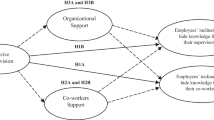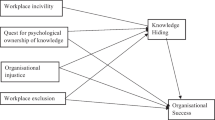Abstract
Front-line employees (FELs) facing double challenges of handling demanding supervisors and irresponsible customers in organizational settings. Performance of service organizations exceedingly reliant on knowledge sharing within organizational employees. FLEs develop the destructive emotions of revenge attitude from abusive supervision and customers’ mistreatment and diminish knowledge sharing. This work aims to determine the effect of abusive supervision (ABS) and customer mistreatment (CMT) on the development of revenge attitude (RVA) and felt obligation (FTO) reduces the knowledge hiding behaviors. Moreover, the FLEs categorical factors of work experience and gender vary the effect of knowledge hiding. Survey data from 201 FLEs police officers. Structural equation modeling partial least square regression (PLS-SEM) SmartPLS 3.1 was utilized to test the model. Study results confirm that ABS and CMT significantly impact the RVA, and FTO reduces the RVA. Moreover, RVA influences the evasive, playing dumb, and rationalized knowledge hiding behaviors, and FTO significantly streamlined the knowledge hiding behaviors. FLEs personal attributes of experience and gender moderates the knowledge hiding behaviour and analysed with PLS multiple group analysis (MGA). The study contributes to the knowledge hiding in service work settings FLEs facing internal and external pressures. Service firms need to train the FLEs to manage the customer with the established working standards and work with the supervisor exceeding expectations. Study limitations and future research opportunities were reported at the end.
Similar content being viewed by others
References
Amayah, A. T. (2013). Determinants of Knowledge sharing in a public sector organization. Journal of Knowledge Management, 17(3), 454–471.
Armeli, S., Eisenberger, R., Fasolo, P., & Lynch, P. (1998). Perceived organizational support and police performance: The moderating influence of socio-emotional need. Journal of Applied Psychology., 83(1), 288–297.
Bradfield, M., & Aquino, K. (1999). The effects of blame attribution and offender likableness on forgiveness and revenge in the workplace. Journal of Management., 25(5), 607–631.
Bies, R. J., Tripp, T. M., & Kramer, R. M. (1997). At the breaking point: Cognitive and social dynamics of revenge in organizations. In R. Giacalone & J. Greenberg (Eds.), Antisocial behaviour in organizations (pp. 18–36). Sage.
Cain, M. K., Zhang, Z., & Yuan, K.-H. (2017). Univariate and multivariate skewness and kurtosis for measuring nonnormality: Prevalence, influence, and estimation. Behaviour Research Methods, 49(5), 1716–1735.
Černe, M., Nerstad, C. G. L., Dysvik, A., & Škerlavaj, M. (2014). What goes around comes around: Knowledge hiding perceived motivational climate, and creativity. Academy of Management Journal, 57, 172–192.
Chin, W. W. (2010). How to write up and report PLS analyses. In V. E. Vinzi, W. W. Chin, J. Henseler, & H. Wang (Eds.), Handbook of Partial Least Squares. Springer.
Cohen, J. (1988). Statistical power analysis for the behavioral sciences (2nd ed.). Lawrence Earlbaum Associates.
Connelly, C. E., & Zweig, D. (2015). How perpetrators and targets construe knowledge hiding in organizations. European Journal of Work and Organizational Psychology, 24(3), 479–489.
Connelly, C. E., Zweig, D., Webster, J., & Trougakos, J. P. (2012). Knowledge hiding in organizations. Journal of Organizational Behaviours, 33(2), 64–88.
Creswell, J. W. (2009). Research design: Qualitative, quantitative, and mixed methods approach. Sage.
Eisenberger, R., Armeli, S., Rexwinkel, B., Lynch, P. S., & Rhoades, L. (2001). Reciprocation of perceived organizational support. Journal of Applied Psychology., 86(1), 42–51.
Faul, F., Erdfelder, E., Lang, A.-G., & Buchner, A. (2007). G*power 3: A flexible statistical power analysis program for the social, behavioural, and biomedical sciences. Behaviour Research Methods, 39(2), 175–191.
Fornell, C., & Larcker, D. F. (1981). Evaluating structural equation models with unobservable variables and measurement error. Journal of Marketing Research, 18(1), 39–50.
Grandey, A. A., Kern, J. H., & Frone, M. R. (2007). Verbal abuse from outsiders versus insiders: Comparing frequency, impact on emotional exhaustion, and the role of emotional labour. Journal of Occupational Health Psychology, 12, 63–79.
Hair, J. F., Risher, J. J., Sarstedt, M., & Ringle, C. M. (2019). When to use and how to report the results of PLS-SEM. European Business Review., 31(1), 2–24.
Harman, H. H. (1976). Modern factor analysis (3rd ed.). The University of Chicago Press.
Harris, L. C., & Ogbonna, E. (2006). Service sabotage: A study of antecedents and consequences. Journal of the Academy of Marketing Science., 34(4), 543–558.
Heizmann, H., & Olsson, M. R. (2015). Power matters: The importance of Foucault’s power/knowledge as a conceptual lens in KM research and practice. Journal of Knowledge Management, 19(4), 756–769.
Henseler, J., Ringle, C. M., & Sarstedt, M. (2015). A new criterion for assessing discriminant validity in variance-based structural equation modelling. Journal of the Academy of Marketing Science, 43(1), 115–135.
Kim, S. H., & Smith, R. H. (1993). Revenge and conflict escalation. Negotiation Journal, 9, 37–43.
Kern, J. J., & Grandey, A. A. (2009). Customer incivility as a social stressor: The role of race and racial identity for service employees. Journal of Occupational Health Psychology, 14, 46–57.
Khalid, M., Bashir, S., Karim, A. K., & Abbas, N. (2018). When and how abusive supervision leads to knowledge hiding behaviours: An Islamic work ethics perspective. Leadership & Organization Development Journal., 39(6), 794–806.
Liu, C., Yang, J., Liu, J., & Zhu, L. (2018). The effect of abusive supervision on employee deviant behaviours: An identity-based perspective. The International Journal of Human Resource Management. https://doi.org/10.1080/09585192.2018.1511613
Moon, H., & Lee, C. (2014). The mediating effect of knowledge-sharing processes on organizational cultural factors and knowledge management effectiveness. Performance Improvement Quarterly, 26(4), 25–52. https://doi.org/10.1002/piq.v26.4
Nga, T. W., & Feldman, D. C. (2015). Felt obligations to reciprocate to an employer, preferences formobility across employers, and gender: Three-way interaction effects on subsequent voice behaviour. Journal of Vocational Behavior, 90, 36–45.
Peng, H. (2013). Why and when do people hide knowledge? Journal of Knowledge Management, 17(3), 398–415.
Peng, D. X., & Lai, F. (2012). Using partial least squares in operations management research: A practical guideline and summary of past research. Journal of Operations Management., 30(6), 467–480.
Podsakoff, P. M., Mackenzie, S. B., Lee, J.-Y., & Podsakoff, N. P. (2003). Common method biases in behavioural research: A critical review of the literature and recommended remedies. Journal of Applied Psychology, 88(5), 879–903.
Riaz, S., Xu, Y., & Hussian, S. (2019). Workplace ostracism and knowledge hiding: The mediating role of job tension. Sustainability., 11, 5547. https://doi.org/10.3390/su11205547
Richman, S., & Leary, L. (2009). Reactions to discrimination, stigmatization, ostracism, and other forms of interpersonal rejection: A multi-motive model. Psychological Review, 116, 365–383.
Seba, I., Rowley, J., & Delbridge, R. (2012). Knowledge sharing in the Dubai police force. Journal of Knowledge Management, 16(1), 114–128.
Sekaran, U., & Bougie, R. (2016). Research methods for business: A skill-building approach (7th ed.). Wiley.
Serenko, A., & Bontis, N. (2016). Understanding counterproductive knowledge behaviour: Antecedents and consequence of intra-organization knowledge hiding. Journal of Knowledge Management., 20(6), 1199–1224.
Shao, R., & Skarlicki, D. P. (2014). Service employees’ reaction to mistreatment by customer: A comparison between North America and East Asia. Personnel Psychology., 67(1), 23–59.
Tepper, B. J. (2000). Consequences of abusive supervision. Academy of Management Journal., 43(2), 178–190.
Tepper, B. J. (2007). Abusive supervision in work organizations: Review, synthesis, and directions for future research. Journal of Management, 33, 261–289.
Tepper, B. J., Carr, J. C., Breaux, D. M., Geider, S., Hu, C., & Hua, W. (2009). Abusive supervision, intentions to quit, and employees’ workplace deviance: A power/dependence analysis. Organizational Behavior and Human Decision Processes, 109, 156–167.
Yeh, C.-W. (2015). Linking customer verbal aggression and service sabotage. Journal of Service Theory and Practice, 25(6), 877–896.
Zellars, K. L., Tepper, B. J., & Duffy, M. K. (2002). Abusive supervision and subordinates’ organizational citizenship behaviours. Journal of Applied Psychology, 87, 1068–1076.
Zhao, H., Xia, Q., He, P., Sheard, G., & Wan, P. (2016). Workplace ostracism and knowledge hiding in service organizations. International Journal of Hospitality Management., 59(1), 84–94.
Acknowledgements
The authors are very thankful for the valuable comments from anonymous reviewers of AJBE, AJBE Chief Editor, Dr. Allan K., K. Chan. We are thankful to the anonymous reviewers of AJBE for providing invaluable feedback, suggestions, and improvements.
Author information
Authors and Affiliations
Corresponding author
Ethics declarations
Conflict of interest
The authors declare no competing interests.
Informed consent
Informed consent was obtained from all individual participants included in the study.
Additional information
Publisher's note
Springer Nature remains neutral with regard to jurisdictional claims in published maps and institutional affiliations.
Annexure
Annexure
Rights and permissions
About this article
Cite this article
Hayat, N., Mukhtar, U. & Salameh, A.A. Exploring the role of abusive supervision and customer mistreatment with a felt obligation on the knowledge hiding behaviours among front-line employees: a group analysis. Asian J Bus Ethics 10, 293–314 (2021). https://doi.org/10.1007/s13520-021-00131-0
Received:
Accepted:
Published:
Issue Date:
DOI: https://doi.org/10.1007/s13520-021-00131-0




